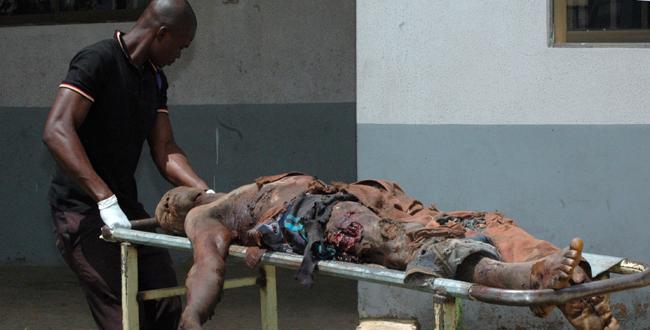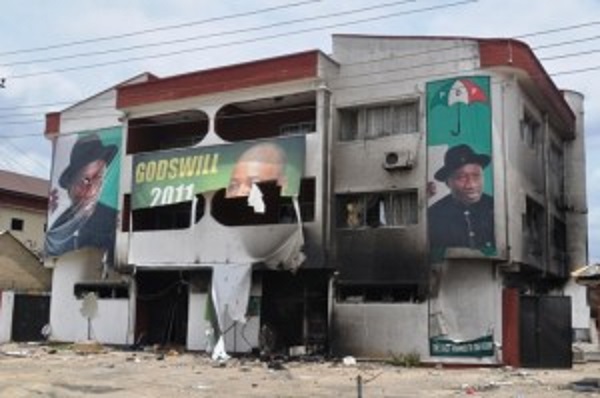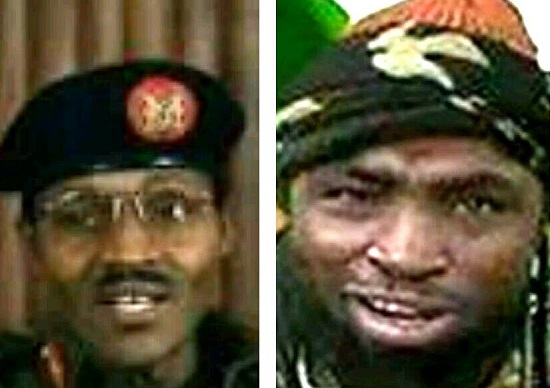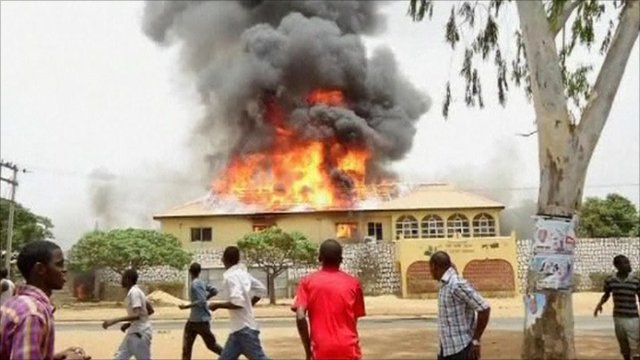
The re-arrival of General Mohammed Buhari to the presidential race against President Goodluck Jonathan has begun to create concerns within select circles of the Nigerian population – considering the bloody outcome of the previous election in 2011 when supporters of Buhari launched a violent attack on the many innocent workers of the Independent National Electoral Commission [INEC] and indigenes of southern Nigeria residing in the northern Nigeria. The attack resulted in the killing and maiming of thousands of sons and daughters of southerners who had signed up with the INEC as an adhoc staff as part of the NYSC service to the nation. The angry Buhari supporters believed the NYSC adhoc workers to be supporters of President Goodluck Jonathan.
Following the killings which resembled a well-orchestrated massacre of non-indigenes of northern Nigeria, an outcry for justice by the affected family appeared to have fallen on deaf ears except what financial relief that had been given to the immediate family members by the INEC and the federal government. The failed Buhari campaign outing remained angry and silent through the agony felt by the grieving families. General Mohammed Buhari failed to publicly condemn the bigot actions of his supporters or to console the grieving families. General Buhari silently walked away into obscure silence while the violence precipitated by his supporters on the Election Day of 2011 continued to grow in depth and reach across the northern parts of the country killing over 10,000 Nigerians and counting.
It is through this background that members of the many churches scattered across the many states of Northern Nigeria express fear over a repeat of the same violence with Buhari’s candidacy in 2015. According to a poll investigation conducted by 247ureports.com, the fear appears more real than publicly expressed by the many spokes persons of the Church or by vocal leaders of the Church and/or of leaders of peoples from communities in southern Nigeria.
Sorry, there are no polls available at the moment.Already, many of the southerners residing in the northern regions of the country are believed to have begun making arrangements of their exit from the northern region before the conduct of the election for fear of violence by the angry supporters of General Buhari. The preparations for an exodus out of the north was quickened by the announcement of Buhari’s victory at the All Progressive Congress [APC] primary elections.
At the Holy at Holy Trinity Anglican Church located in Sabon Gari Kano – where the dominate group consists of south western Nigerians – many of the worshipers have told the Vicar of the church of their expected absence from the Church from the yuletide season till days after the general elections in February 14, 2014. Some of the families in the church decided to remain at their respected villages while the bread winner in the family returns to Kano after the yuletide season. At the St. Stephen Anglican Church in Sabon Gari Kano – where the dominate group is south easterners – many of the worshipers already departed Kano for good. They fear the violence that a Buhari candidacy will generate. Many within the St. Stephen Church worshippers point to the reason for their fears as based on Buhari being the spiritual/political leader of the dreaded Jihadist group – the Boko Haram. At St. George Anglican Church located in the outskirts of Sabon Gari – where the dominate group consists of elite/bourgeoisie southerners – many have expressed fears over Buhari’s candidacy and his perceived closeness to the dreaded Jihadist group, the Boko Haram.
In Bauchi State, the sentiments of fear are the same as in Kano for the non-indigenes particularly for the non-Muslims who have lived through the 2011 violence precipitated by Buhari’s failed presidential outing. Many of the non-indigenes and non-Muslims fear that the upcoming election would ferment the type of violence that Boko Haram had been exhibiting in the State since Buhari lost out in the elections. They recite the promise made by Buhari guaranteeing bloodshed should he not become the President of Nigeria. One member who was courageous to speak – from First Methodist Church in Bauchi – gave his name as Mathias Agbo. He expressed his fears as stemming from the promises made by Buhari and other fanatic Muslims of making the country ungovernable and bloody should anyone other than Buhari win the 2015 presidential elections. Mathias Agbo is married with two boys and a girl. His children were born in Bauchi and attend school in Bauchi but he has resolved to send them back home in Edo against an anticipated violence. “I am working on my family to transfer to the southern part of Nigeria to leave the north and Buhari with their sharia and boko haram”, said an angry Mathias who pointed to the generality of the movement towards Muslim fanaticism as the cause for the increased bigotry in the north particularly the supporters of Buhari. Seconding Mathias’ fear was another ranking member of the Christian community in Bauchi, Pastor Francis Otti. He confessed that his folks share the same fear of an impending violence associated with the 2015 presidential election especially with the involvement of General Mohammadu Buhari in the race. “They fear the same will happen as in 2011” said the pastor who also pointed to the perceived sentiment of Boko Haram being in the same camp with Buhari.
In Abuja, the fears are the same. The members of Redeemed Church in Karu [near Karu site], Abuja express a certain unease among the non-northerners in the congregations. “We feel they will come after us immediately it’s clear that Buhari has lost the election” said Susan Okon who also pointed to the growing sentiment of Boko Haram being in close quarters with Buhari. Mrs. Okon told 247ureports.com that her family has decided not to travel for Christmas in order to travel in January and return after the elections. One of the members of the church even postulated that Buhari and the leaders of Boko Haram to be working together to return power to the fanatic Muslim set of the north. He gave his name as Clement Aigbe and said that Buhari “cannot say to be totally innocent of the lives lost to the jihadist movement of Boko Haram. He is one of the benefactors”. Other members spoke angrily over the fear of violence targeted at Christians living in the north. Some pointed to the Sharia movement funded by the federal government as partly responsible for the growing fanaticism – that has provided fuel for the supporters of Buhari to spread violence to non-Muslims living in northern Nigeria.
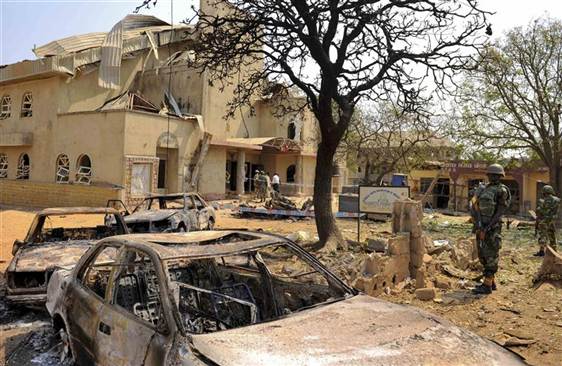
Interestingly, the fears espoused by the Christians living in northern Nigeria may not be without factual basis or foundation. The spread of Sharia in northern Nigeria took to its highest during the first four years of Jonathan presidency – and it touched on the many sensitive areas of the north – of which the leaders when campaigning for the spread of sharia made many inflammatory statements and threats should Sharia not be allowed to be the law of the land/Nigeria. General Mohammadu Buhari was chief among the many northerners who promised bloodshed should the law of sharia be stopped from being the law in Northern Nigeria. Buhari made the statement that Nigeria will seize to know peace should sharia be stopped. The then President Obasanjo buckled under pressure and allowed the Buhari group to have their way. Sharia immediately spread – with 12 northern states adopting Sharia – and also the adoption of Islamic Police [hisbah guards] to enforce the Sharia law and arrest defaulters. The Governors of the respective 12 states opened up the state finances to the new Sharia project. Kano budgeted over 1.1billion annually for Sharia and its militant wing, the Hisbah, Bauchi State budgeted 850million annually to sharia project and hisbah. The remainder of the 10 State followed in the same manner. The growth of the hisbah helped further the militarization of the Muslim fanatics in northern Nigeria. The militarization of Muslim fanatics by the facilities accorded the Hisbah group provided the necessary cover and a suitable breeding ground for the Boko Haram.
Most of the 12 states have since abandoned the strict enforcement of sharia law. Some have rolled back considerably on the annual budgetary allotment for sharia and its militant wing, the hisbah. But Boko Haram has since found a more suitable breeding ground – in that – it has grown and has found better funding streams from politicians and other local and international jihadists.

